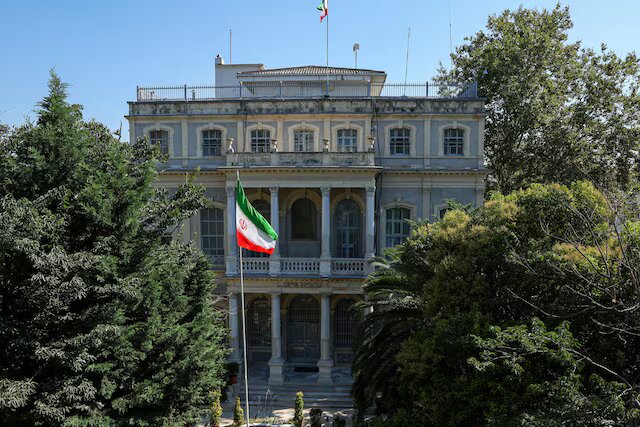Substantive progress in ‘serious, frank, and detailed’ talks with E3: Iran

TEHRAN – Iranian Deputy Foreign Minister Kazem Gharibabadi says Iran and the E3 (Britain, France, and Germany) held “serious, frank, and detailed” talks in Istanbul on Friday, exchanging specific proposals on sanctions relief, the nuclear file, and the controversial snapback mechanism.
Posting on X after the meeting, Gharibabadi said the Iranian delegation strongly criticized the European stance on the recent war of aggression against the Iranian people, and reaffirmed Tehran’s principled positions on its nuclear rights.
He noted that both sides had come to the table with concrete proposals and agreed to continue consultations in the coming weeks.
The European countries, along with China and Russia, are the remaining parties to a 2015 deal - from which the U.S. withdrew in 2018.
A deadline of Oct. 18 is fast approaching when the resolution governing that deal expires.
At that point, all UN sanctions on Iran will be lifted unless a "snapback" mechanism is triggered at least 30 days before. This would automatically reimpose those sanctions, which target sectors from hydrocarbons to banking and defence.
To give time for this to happen, the E3 has set a deadline of the end of August to revive diplomacy. Diplomats say they want Iran to take concrete steps to convince them to extend the deadline by up to six months, Reuters reported.
Iran would need to make commitments on issues including eventual talks with Washington, full cooperation with the International Atomic Energy Agency, and accounting for 400 kg (880 pounds) enriched uranium, whose whereabouts are unknown since last month's strikes by Israel and the U.S. on Iran’s nuclear plants.
Ahead of the talks, senior Iranian officials had underscored the Islamic Republic’s unwavering commitment to its peaceful nuclear program and denounced the conduct of the European parties to the 2015 nuclear deal.
Foreign Minister Abbas Araghchi, speaking on Thursday during a meeting with the family of late Major General Mohammad Bagheri—killed in Israeli airstrikes—warned that Iran would not relinquish its right to uranium enrichment.
“Our enrichment will continue,” he said. “This is a right that cannot be negotiated,” Araghchi called the June 13 Israeli strikes, followed by U.S. attacks on Iranian nuclear sites, blatant violations of the UN Charter and the Nuclear Non-Proliferation Treaty (NPT), stressing that any nuclear cooperation with the West must be based on mutual respect and recognition of Iran’s rights.
Foreign Ministry Spokesperson Esmaeil Baghaei also said in remarks published Friday that the Istanbul meeting was a key test for the Europeans. He warned that the E3 no longer had legal or moral grounds to invoke JCPOA mechanisms due to their repeated non-compliance.
“Europe cannot act as both violator and enforcer,” Baghaei told IRNA. He accused the E3 of enabling Israeli sabotage efforts and questioned whether they would continue sacrificing their credibility for the sake of Tel Aviv.
Baghaei also confirmed that Iran had partially suspended cooperation with the IAEA following the attacks, saying future engagement would depend on Supreme National Security Council decisions. He added that an IAEA delegation is expected in Tehran soon, but no nuclear site inspections are currently scheduled. Talks will instead focus on redefining the framework for interaction.
The Istanbul meeting followed weeks of heightened tension and marked a continuation of expert-level negotiations between Iran and the E3/EU, after earlier rounds in Geneva and New York. While the talks remain difficult, Iranian officials have reiterated their willingness to engage—so long as their sovereignty and nuclear rights are respected.
On June 13, Israel launched a surprise and unprovoked military assault on Iran, assassinating several senior military commanders, nuclear scientists, and civilians. More than a week later, the United States escalated the conflict by targeting three Iranian nuclear facilities—an act Tehran has censured as a grave breach of the UN Charter, international law, and the Nuclear Non-Proliferation Treaty (NPT).
In response, Iran’s Armed Forces launched hundreds of ballistic missiles and drones against strategic Israeli positions, as well as targeting the U.S. Al-Udeid Air Base in Qatar—the largest American base in West Asia.
On June 24, after nearly two weeks of sustained retaliatory operations, Iran succeeded in halting the coordinated Israeli-American military assault.
Prior to the June 13 attacks, Iran and the United States had held five rounds of indirect negotiations regarding Tehran’s peaceful nuclear program. These talks, mediated by Oman, were set to continue in Muscat on June 15—but the planned
Leave a Comment